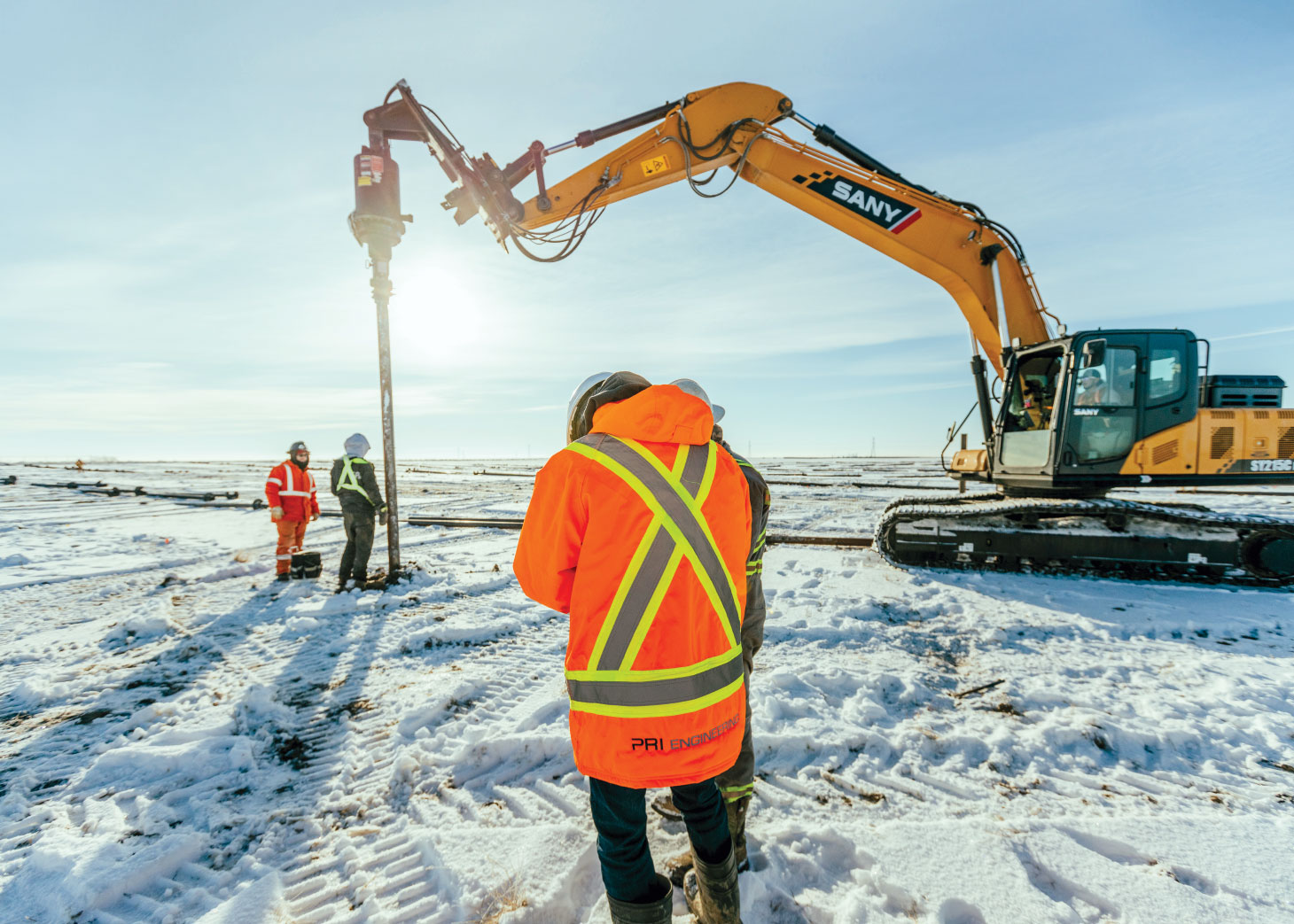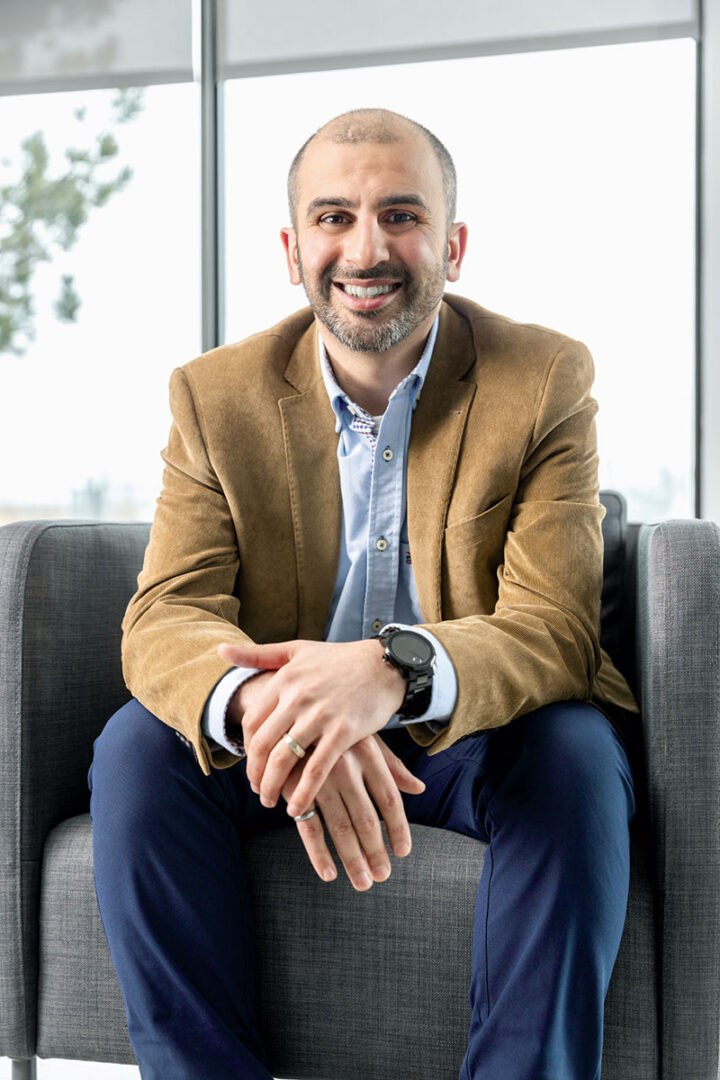
With more than 200 combined years of engineering, consulting and construction experience, PRI Engineering was formed in Lindsay, Ont., in early 2019, by Arash Yazdani, with extensive support from partners Manish Nayar and Vishal Lala. The company provides deep foundation design, including construction support and completion of foundation load testing.
Yazdani, PRI’s COO, spent the first eight years of his career with WPS, before deciding to work in the renewable energy sector, and leaving WPS to join Polar Racking.
“More specifically, I helped the Polar Racking team build a ground mount division at the already successful Canadian solar racking company. The main intention was to provide an integrated geotechnical foundation design service at the racking supplier, as this would provide a ‘turnkey solution’ to existing and potential customers.”
However, after a year and a half of working with the Polar Racking team, a project involving designing foundations for a competitor’s racking system came along. This project was beyond Polar Racking’s typical scope of work, adding complexity.
“At this point, the owners of Polar Racking identified the opportunity to start an engineering firm, which, at the commencement of the firm, would focus on foundation design for solar racking systems,” Yazdani said. “The intention was to grow the business into other sectors, specifically more traditional geotechnical and subsurface engineering, which has successfully taken place.”
Today, the company’s work in Ontario is primarily in the infrastructure sector, while most projects beyond Ontario are in the renewable energy sector.
“PRI Engineering has also invested heavily into a geotechnical laboratory where we currently have capabilities of supporting our own and external customer needs, with plans of expanding into other services,” said Yazdani.
Corporate structure
With a total of 25 individuals at the company, Yazdani says the company has grown significantly since 2019, when it started with four employees moving from Polar Racking to establish PRI Engineering.
“When initially established, the focus was on renewable energy as this was where a good quantity of our present opportunities were,” Yazdani said. “However, as the team grew and additional members were added, an infrastructure division was developed, which focuses more so on projects such as roads, bridges, linear infrastructure, residential and commercial developments.”
Today, there are four department managers: two for the solar division, an accounting manager and a business development manager.
“Reporting directly to the various managers are project leads and field technicians who do a major portion of the heavy lifting on project-related tasks,” he said.
With its head office in Lindsay, the company has a satellite location in Mississauga, Ont., and another full office in Calgary, Alta. PRI actively works in Canada, the U.S. and the Caribbean.
“We are currently licensed in most Canadian provinces with stamping partners for Caribbean and U.S. projects,” Yazdani said. “And we have worked on projects as far north as Inuvik, N.W.T., and as far south as Barbados, west as Haida Gwaii, B.C., and as far east as Halifax, N.S.”

“Being involved in the larger engineering regulatory and advocacy community is an important part of seeing sustainability and growth.”
Arash Yazdani, PRI Engineering
Prominent project
When asked about noteworthy deep foundations projects the company has been involved with, Yazdani doesn’t miss a beat.
“PRI was the designer for the first application of an adfreeze foundation in Inuvik, N.W.T. We also utilized frost sleeves to reduce adfreeze pressure acting on deep foundations, causing a major decrease in the amount of frost uplift acting on the foundation. We also designed these frost sleeves utilizing a Yellow Jacket, which is the first application of this product used in solar foundation design for three major projects in Alberta.”
A changing industry
As for how the construction and engineering fields have changed over the last decade, he says engineering consulting is affected by artificial intelligence and software to help with automation and streamlining communications.
“While this definitely has the potential of improving communications and reducing overall efforts in many instances, there is a natural lag of implementing these technologies and seeing the full benefit,” he said.
What’s next?
“Overall, the initiative is to look at utilizing our specialization in the renewable energy sector to move into different markets, while also leveraging our experience in the field of infrastructure to diversify our project mix,” said Yazdani of what’s next for PRI. He says it is also important for companies like PRI to be involved in industry associations.
“These are mandatory organizations to practise engineering in these sectors. Being involved in the larger engineering regulatory and advocacy community is an important part of seeing sustainability and growth in diversifying and moving the engineering profession into the new century,” he said.
If that isn’t enough, the company will also enthusiastically continue its podcast cleverly named, “It’s Soil, Not Dirt.”
“The podcast has truly been a passion project of myself,” Yazdani said. “Geotechnical engineering is a field many don’t even know exists, but interact with on a daily basis. Therefore, we see a major benefit in developing and continuing with our podcast to hopefully educate our network and the general public about the field.”